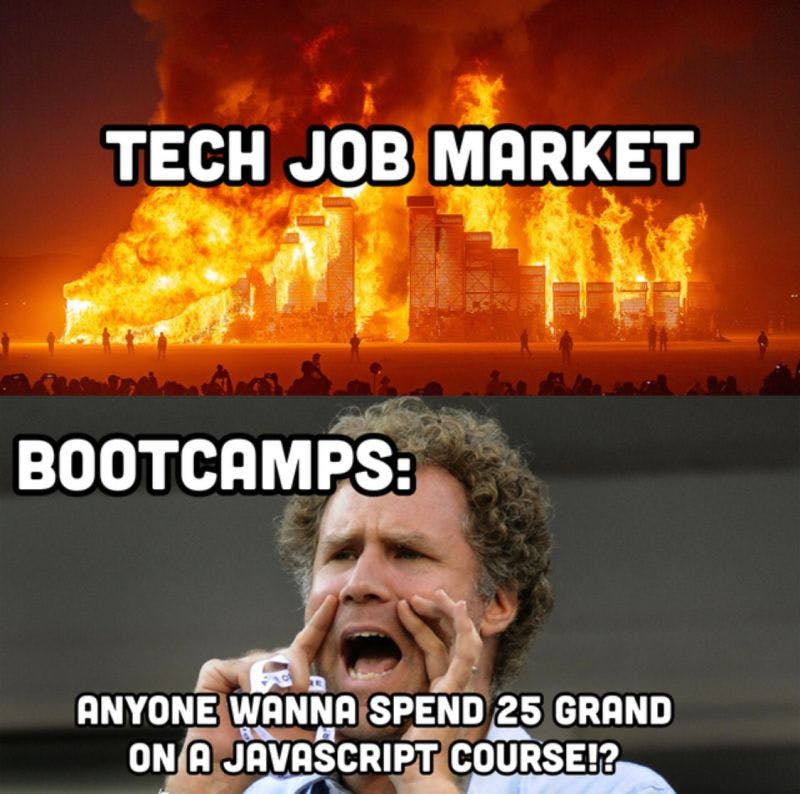- Published on
Should You Do a Coding Bootcamp? Like Everything Else in Software, the Answer is “It Depends”
- Authors

- Name
- Ben Goldstein
Coding Bootcamps can be a great way to supercharge your learning, but they come with a hefty price. Are they right for you?

The tech market will come back. Right? Right??
If you’re thinking about learning to code, and we definitely think you should be, you may be wondering if a Coding Bootcamp is right for you. Over the last decade or so, dozens if not hundreds of bootcamps have sprung up in all shapes in sizes. And while they differ from one another in many key ways, they fundamentally offer a few things:
- (+) A structured curriculum to help teach you to code
- (+) A mix of live instruction and ‘take-home’ work
- (+) A community of students, teachers, and alumni to help support your learning journey
- (+) Some career placement help
- (-) A hefty price tag
- (-) A lot of time commitment on your part
Those last two, particularly in this economic moment, are probably the hardest to swallow for anyone considering a bootcamp. If you were recently laid off, or are just concerned about job insecurity, dipping into your savings or taking out a loan are probably not very appetizing right now. Nor is the prospect of spending a big chunk of your time — time that could be used for job searching! — on something that might not pay off.
The case for bootcamps
Full disclosure, I never did a bootcamp. I have applied to several, but ultimately ended up turning them down. But I have worked with numerous great software engineers who have come out of bootcamps, and witnessed first hand the progress folks can make during these programs.
1. Your learning is structured out of the box.
If you’re learning to code on your own, you’re probably drowning in material. There are thousands, maybe even millions, of free tutorials out there.
Some are great. Some are trash. Some are horribly outdated, and if you try to copy their code, will lead you down frustrating rabbit holes of fixing arcane error messages. These latter ones are hard to spot, but they can be absolute poison to your momentum and motivation, because you’ll wonder why, after following instructions perfectly, you are left with nothing but a ton of scary red error messages.
Bootcamps solve this problem for you by cherry-picking the best material, and often they have their own material. Instructors are well versed in the bootcamp’s curriculum and can quickly help you when you’re stuck.
Even more valuably, the bootcamp coursework is put together knowing where you will start, where you will wind up, and everything in between. They let you keep scary things in black boxes for as long as necessary until you’re ready. This can be tremendously valuable when starting out.
2. You’ll get individualized attention and peer support
Here at I Can Learn To Code, we firmly believe that anyone can learn to code. But, there are definite advantages to having a community and access to teachers who can help you when you get stuck. Because, you’ll get stuck sometimes. (It still happens to me all the time ;)
Don't forget to join our free slack community if you need some support!
When you do get stuck, the support network of a bootcamp can be really valuable. What might take you days to figure out could be a simple fix a more senior engineer can spot in a few minutes, thus unblocking you to continue learning unimpeded.
3. You (might) get some help with career placement afterward
Many bootcamps offer a guaranteed placement model, or at the very least allow you to defer your tuition until after you get a job. The most succesful of these bootcamps have existing relationships with hiring partners. Often, these hiring partners are large organizations that are specifically looking to hire and mentor early-career or junior developers. Because, make no mistake, after a bootcamp — you’ll still be at an early-career or junior level 99% of the time.
Sounds pretty good, doesn’t it? For me, I was always attracted to the idea that after $X and X months, I would be a developer. Bootcamps offer a type of ‘guaranteed transformation’ — or at least that’s what they sell.
Now let’s take a look at the other side.
The Case Against Bootcamps
1. They are expensive!
I’ve seen bootcamps range anywhere from $5,000 to well over $20,000. These are for programs that are at most six months. Of course, if you can land a six-figure job right out of a bootcamp, making that up isn’t too hard, but it isn’t exactly easy, either.
2. Bootcamps are sometimes a negative hiring signal
As a hiring manager, and in discussions with other engineering managers, many folks see fresh bootcamp graduates as simply ‘too junior.’ Yes, they have learned HTML/CSS/ Javascript and have built a really cool To-do app. However, they haven’t gotten much experience in some of the core skills of a professional software engineer:
- working on existing applications and codebases
- working with data at scale
- working with other engineers
- working outside the guardrails of a bootcamp
It’s not that people won’t hire bootcamp graduates, but from my personal experience, most hiring managers don’t want to be the first person to hire a bootcamp graduate. After you have 1 or 2 years of experience under your belt, you’re usually golden. But getting that first hiring manager to take a chance on you as a bootcamp graduate can be difficult. Pay close attention to this especially if you are doing a program that does not offer an employment guarantee or have a strong network of hiring partners.
3. At some point, all software engineers have to figure out things on their own
The very best bootcamps teach problem solving, not simply how to sling javascript. As your career develops, you will inevitably find yourself in uncharted waters, where neither your bootcamp training nor stack overflow will be able to save you. You will have to figure things out on your own. To me, this is one of the most satisfying parts of being a developer. But whether you do a bootcamp or not, that time will come.
As your career develops, you will inevitably find yourself in uncharted waters, where neither your bootcamp training nor stack overflow will be able to save you.
4. You aren’t sure you want to become a professional software developer
Not everyone who learns to code wants to do it full time. Nor should they. There are many great ways to become more technically literate without changing jobs. If you just want to dabble, have fun, develop a little more understanding of how technology works, a bootcamp might be overkill for you. I’d recommend starting small, and if your interest is really piqued, then consider going for it.
So — is a bootcamp right for me?

The answer to pretty much everything in Software Engineering
It really does depend. I generally advise people to stay away from bootcamps until they’ve played around with code for a few months, and are pretty dead-set on working in software engineering professionally. Even then, there are multiple paths to getting your first job as an engineer. A few parting thoughts:
- If you’re considering a bootcamp, see if you can find their curriculum online. You can usually find the entire thing, or at least similar resources for free. You might then try doing that curriculum on your own. If you get stuck, can you find other people to help you, or better yet, solve your own problems? If yes, great. If not, maybe the structure of a bootcamp would be helpful for you!
- A Bootcamp is a big financial decision. You can try a dry-run with something smaller and cheaper, like a free or cheap Udemy course.
- Don’t bet on having a job immediately after a bootcamp, especially in this hiring market. Generally speaking, junior engineering roles are the first to dry up when things get tough (there are absolutely exceptions to this).
- Got some friends in a similar boat? Maybe you can get together and form a bit of a self-teaching group to help each other. Or head over to the I Can Learn To Code Community Slack for some free support!